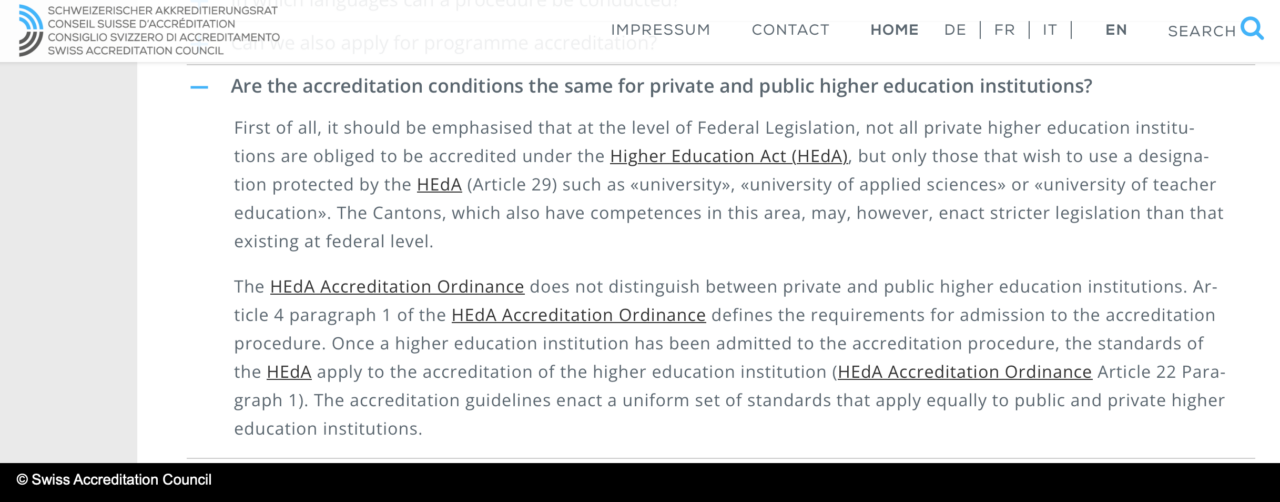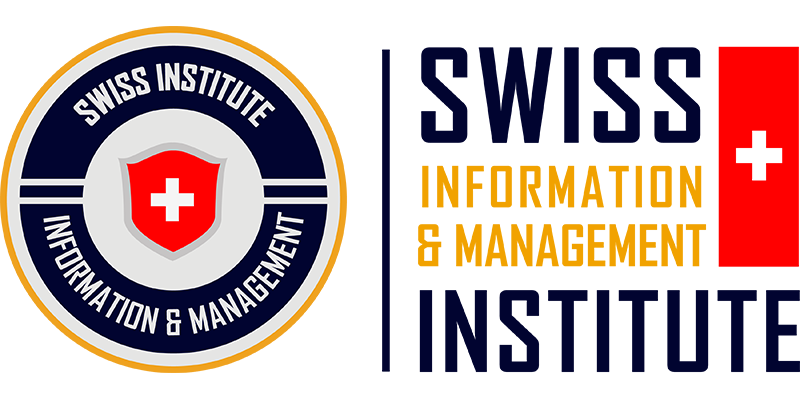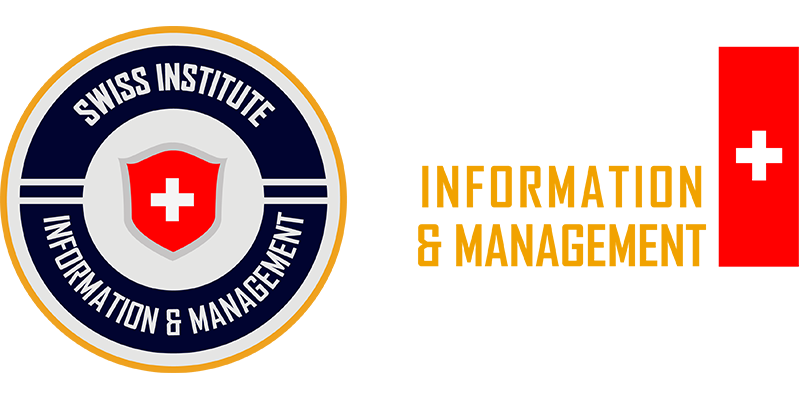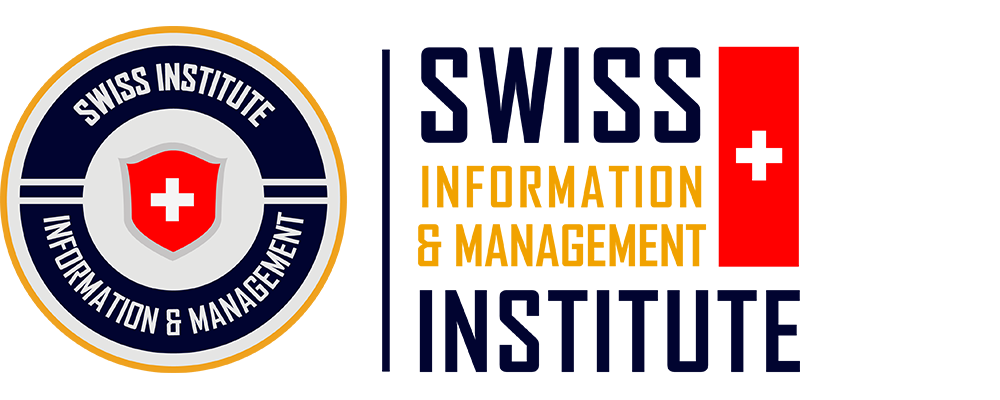
Accreditation
Multi Recognition by University Partners
01
SIMI selects top universities to recognize its training and co-award degrees, maximizing students' post-graduation success.
02
Students benefit from subsidized packages offered by partner universities, as SIMI Swiss tuition is expensive and unaffordable for most.
03
International collaboration is led by our International Cooperation Institute, Schweizer Institut für Hochschulbildung in Management und Innovation (MI Swiss)
04
After graduation, students receive dual degrees from partner universities and have maximum opportunities for top-up studies.

The C.A.T.S for Smart University Strategy
Contents
Accreditation
Technology
Services
FAQs for Accreditation
What accreditations does SIMI Swiss have?
Although accreditation in Switzerland is optional and not mandatory, SIMI SWISS is the pioneering higher education institution with accreditation at both the programmatic and institutional levels:
- Accredited by the Accreditation Service for International Schools, Colleges and Universities (ASIC) at the highest level (Premier Institution); Read more [HERE]
- A full member of SVEB (Swiss Federation for Adult Learning); Read more [HERE]
- Accreditation of the management system compatible with the European Quality Assurance Framework for Vocational Education and Training (EQAVET) and Standards and Guidelines for Quality Assurance in the European Higher Education Area, awarded by the HEAD – Higher Education Accreditation Division; Read more [HERE]
- Achieve ISO 21001:2018, complying with the European Quality Assurance Framework for Vocational Education and Training (EQAVET) and the Quality Assurance in the Higher Education Area Requirements (EGS); Read more [HERE]
- Programs is recognized by Ofqual UK.Gov Awarding Bodies; OTHM Read more [HERE]; Qualifi Read more [HERE]
- Learning outcomes are mapped to the UK national occupational standards. Read more [HERE]
Reference:
- Guidelines of how to check the accreditation of SIMI Swiss: CLICK HERE
What is the value of institutional accreditation for higher education graduates in terms of acceptance in the professional world and admission to other higher education institutions at national and international level?
Accreditation is not directly related to the acceptance of graduates in the world of work. However, accreditation plays a greater role in admission to other national and international higher education institutions.
Source: Swiss Accreditation Council; extracted from the FAQ section, from the question, “What is the value of institutional accreditation for higher education graduates in terms of acceptance in the professional world and admission to other higher education institutions at national and international levels?” Read more here.

I want to study at an institution that is not institutionally accredited – should I assume that it is of poor quality?
No, this conclusion cannot be drawn in this way.
Source: Swiss Accreditation Council; extracted from the FAQ section, from the question, “I want to study at an institution that is not institutionally accredited – should I assume that it is of poor quality?” Read more here.

If a higher education institution is not accredited, can it still award diplomas?
In principle, yes, but the laws of the siting cantons must be observed, as the awarding of titles is the responsibility of the cantons. The right of a higher education institution to award titles is also not tied to accreditation.
Source: Swiss Accreditation Council; extracted from the FAQ section, from the question, “If a higher education institution is not accredited, can it still award diplomas?” Read more here.

Does every higher education institution in Switzerland have to be accredited?
Not all HEI in Switzerland have to accredited.
In Switzerland, a higher education institution must be accredited in accordance with the Higher Education Act (HEdA)(Article 29) if it wishes to use a protected name such as «university», «university of applied sciences» or «university of teacher education» in a national language or in another language. This also applies to versions derived from it, such as «tier-one colleges» or «UAS colleges». On the other hand, terms such as «higher education institute», «business school» or similar are not protected by federal law. On the other hand, it may be that cantonal law is more restrictive than federal law. In this case, the canton where the respective university is located can provide you with further information.
Source: Swiss Accreditation Council; extracted from the FAQ section, from the question, “Does every higher education institution in Switzerland have to be accredited?” Read more here.

Why are not all higher education institutions in Switzerland accredited?
Private higher education institutions that do not wish to make use of the right to use reserved designations under Article 29 of the Higher Education Act (HEdA) do not have to be accredited. However, according to Article 2 HEdA, all public higher education institutions – i.e., federal and cantonal higher education institutions – must be accredited.
Source: Swiss Accreditation Council; extracted from the FAQ section, from the question, “Why are not all higher education institutions in Switzerland accredited?” Read more here.

Does the accreditation of a higher education institution also mean that its study programmes are accredited?
In Switzerland, the accreditation of study programmes is not mandatory. Within the framework of institutional accreditation, higher education institutions prove that their quality assurance system covers all areas, and thus also the study programmes. However, they are thereby not formally accredited as programmes.
Source: Swiss Accreditation Council; extracted from the FAQ section, from the question, “Does the accreditation of a higher education institution also mean that its study programmes are accredited?” Read more here.

Are the accreditation conditions the same for private and public higher education institutions?
First of all, it should be emphasised that at the level of Federal Legislation, not all private higher education institutions are obliged to be accredited under the Higher Education Act (HEdA), but only those that wish to use a designation protected by the HEdA (Article 29) such as «university», «university of applied sciences» or «university of teacher education». The Cantons, which also have competences in this area, may, however, enact stricter legislation than that existing at federal level.
The HEdA Accreditation Ordinance does not distinguish between private and public higher education institutions. Article 4 paragraph 1 of the HEdA Accreditation Ordinance defines the requirements for admission to the accreditation procedure. Once a higher education institution has been admitted to the accreditation procedure, the standards of the HEdA apply to the accreditation of the higher education institution (HEdA Accreditation Ordinance Article 22 Paragraph 1). The accreditation guidelines enact a uniform set of standards that apply equally to public and private higher education institutions.
Source: Swiss Accreditation Council; extracted from the FAQ section, from the question, “Are the accreditation conditions the same for private and public higher education institutions?” Read more here.

Quality accreditation is not mandatory and does not apply to SIMI Swiss, so why does SIMI Swiss still pursue accreditation?
Although quality accreditation is not mandatory and does not apply in the case of SIMI Swiss, SIMI Swiss does not view accreditation as a marketing or image-building activity. Instead, SIMI Swiss sees accreditation as an opportunity for continuous quality improvement, helping students gain access to a world-class program.
View all of SIMI Swiss’s accreditations here.
Quality accreditation is not mandatory for SIMI Swiss, so why does SIMI Swiss plan to obtain accreditation from the Swiss Accreditation Council and the Agency of Accreditation and Quality Assurance?
SIMI Swiss aims to become a University of Applied Sciences in Switzerland, and this is an important step to help SIMI Swiss better control the quality, outcomes, and opportunities for continuous improvement.
See more about the plan to become a Swiss University of Applied Sciences with Federal status [HERE]
FAQs for Recognition
What is the difference between accreditation and recognition?
The difference between accreditation and recognition lies in their purpose and function in the context of education:
Accreditation:
- Definition:
Accreditation is a formal process where an independent authority evaluates and certifies that an institution or program meets specific quality standards. It ensures the institution provides education at an acceptable level of quality. - Focus:
Primarily focuses on quality assurance and adherence to established educational standards. - Authority:
Conducted by authorized accrediting agencies, often independent or government-approved, such as AACSB for business schools or regional accreditation bodies in the U.S. - Scope:
Applies to institutions or programs and verifies their legitimacy and standardization. - Impact:
Accreditation assures stakeholders (students, employers, etc.) that the institution or program meets high educational standards and allows access to financial aid, credit transfers, or further studies.
Recognition:
- Definition:
Recognition refers to the acceptance or acknowledgment of an institution, program, or qualification by an authority, government, or organization, often for legal or professional purposes. - Focus:
Primarily focuses on acceptance of the qualification for further studies, employment, or other official purposes. - Authority:
Determined by governments, professional bodies, or international organizations. - Scope:
Recognition does not necessarily evaluate quality but confirms that a degree or qualification is accepted within a specific jurisdiction or industry. - Impact:
Recognition determines whether qualifications are valid for purposes like employment, licensing, or further education in a specific region or field.
Summary of the Difference:
- Accreditation ensures the quality and legitimacy of the educational offering.
- Recognition determines whether the accredited qualification is accepted in a particular context or by a particular organization or government.
Example:
- In the context of SIMI Swiss and the Polytechnic Institute of Switzerland, higher education institutions are not mandatory to obtain accreditation in Switzerland after receiving a license but might seek recognition from a professional organization in another country for their graduates to practice in that field.
- Although not mandatory, to ensure quality, continuous improvement opportunities, and broader recognition in the workplace, the Swiss Information and Management Institute (SIMI Swiss) has achieved accreditation at both the institutional and program levels. The programs of SIMI Swiss and the Polytechnic Institute of Switzerland (PIS) are mapped and recognized by Ofqual UK.Gov Awarding Bodies, thereby maximizing the potential for qualifications from SIMI Swiss and PIS to be widely recognized in the workplace across most countries and territories. Read more [HERE]
Is recognition automatic?
No, recognition is not automatic. It often depends on specific factors and may require additional processes to ensure a qualification or institution is recognized in a particular country, organization, or industry. Below are key points to understand about recognition:
Factors Affecting Recognition:
Accrediting Body:
- If a program or institution is accredited by a globally or regionally reputable body, it has a higher chance of being recognized.
- For example, qualifications aligned with frameworks like Ofqual (UK) or accredited by internationally respected bodies are more likely to be recognized.
Jurisdictional Policies:
- Each country or organization has its own policies for recognizing foreign qualifications. Recognition often requires alignment with local standards.
Professional or Regulatory Requirements:
- Some fields (e.g., medicine, law, engineering) require qualifications to meet professional licensing standards, which might involve additional verification, exams, or certifications.
Mutual Recognition Agreements (MRAs):
- Some countries have agreements to recognize each other's qualifications, which can simplify the process.
Process of Recognition:
- In many cases, individuals or institutions must apply for recognition by submitting documentation, such as transcripts, accreditation proof, or program mapping.
Key Takeaway:
Recognition is not automatic and often involves ensuring alignment with local, national, or professional standards. Accredited programs or qualifications mapped to international frameworks, like those of Ofqual UK, can streamline recognition processes but do not guarantee automatic acceptance.
How can I verify if a diploma from SIMI Swiss and the Polytechnic Institute of Switzerland is recognized when it is mapped to an Ofqual UK.Gov Awarding Body?
The Swiss Information and Management Institute (SIMI Swiss) and the Polytechnic Institute of Switzerland (PIS) have aligned their programs with UK awarding bodies regulated by Ofqual, such as OTHM and QUALIFI. This alignment allows students to receive dual qualifications: one from the Swiss institution and an additional diploma from the UK awarding body.
To verify the recognition of a diploma from SIMI Swiss or PIS, you can check the accreditation status of the associated UK awarding body (e.g., OTHM or QUALIFI) on the Ofqual Register of Regulated Qualifications. This ensures that the UK qualification meets specific quality standards. Additionally, since these qualifications are mapped to the Regulated Qualifications Framework (RQF), they are recognized within the UK and can facilitate broader international recognition.
However, recognition of qualifications can vary by country and industry. It's advisable to consult with local professional bodies or employers in your target region to confirm acceptance. For instance, in Switzerland, the State Secretariat for Education, Research and Innovation (SERI) provides information on the recognition of foreign qualifications (the qualification come from Ofqual Uk.Gov Awarding Bodies).
In summary, while the mapping of SIMI Swiss and PIS programs with Ofqual-regulated awarding bodies enhances their recognition potential, it's important to verify acceptance with relevant authorities or organizations in the specific country or industry where you intend to use the qualification.
How can one identify and distinguish between regulated and non-regulated professions in Switzerland?
In Switzerland, professions can be broadly categorized into regulated and non-regulated professions. Understanding the difference between these two categories is crucial for both Swiss citizens and international professionals aiming to work in Switzerland.
Regulated Professions:
Definition:
- Regulated professions are those that require specific qualifications and certifications by law to practice. These professions are often subject to oversight by professional bodies or government agencies.
Examples:
- Healthcare: Doctors, nurses, pharmacists, and other healthcare professionals must meet stringent educational and certification requirements.
- Law: Lawyers and notaries must be admitted to the bar and fulfill specific educational criteria.
- Engineering and Architecture: Certain engineering disciplines and architecture require accreditation from recognized professional bodies.
- Finance: Some financial roles, such as auditors and accountants, may require certification from recognized institutions.
Requirements:
- Qualifications: Specific academic degrees, professional training, and sometimes additional exams.
- Certification: Registration with a professional body and compliance with ongoing professional development requirements.
- Licensing: Official licenses to practice, often requiring renewal.
Non-Regulated Professions:
Definition:
- Non-regulated professions do not have legal restrictions on who can practice. While qualifications can enhance employability, they are not legally mandated.
Examples:
- Managers: Managers play a crucial role in the success and efficiency of organizations like CEO, HRM…
- Journalists: Their roles are multifaceted and encompass various responsibilities that ensure the delivery of accurate, unbiased, and timely information
- Information Technology: Roles such as software developers, IT consultants, and network administrators.
- Marketing and Sales: Marketing specialists, sales representatives, and business development professionals.
- Creative Industries: Graphic designers, artists, writers, and media professionals.
- Hospitality and Tourism: Hotel management, tour operators, and restaurant management.
Requirements:
- Qualifications: While not legally required, relevant academic degrees and professional certifications can improve job prospects.
- Experience: Practical experience and a proven track record are often highly valued.
- Skills: Specific skills and competencies relevant to the industry.
Key Differences:
Legal Requirements:
- Regulated: Legally mandated qualifications and certifications.
- Non-regulated: No legal restrictions, though qualifications can enhance employability.
Oversight:
- Regulated: Subject to oversight by professional bodies and government agencies.
- Non-regulated: No formal oversight, though industry standards and employer preferences apply.
Mobility and Recognition:
- Regulated: International qualifications may require recognition and equivalence assessments.
- Non-regulated: More flexibility, with qualifications and experience often being transferable.
Programs at SIMI Swiss lead to non-regulated professions:
- As a private higher institute in Zug, Switzerland, SIMI Swiss offers single-degree programs (degrees awarded only by SIMI) in the field of non-regulated professions.
- These non-regulated profession programs enable graduates to work in fields such as management, CEO, human resources director, and principal (director of an educational institution).
Programs of SIMI Swiss lead to regulated professions:
SIMI Swiss only offers programs leading to regulated professions in collaboration with another university.
Through the dual degree system and mutual recognition of results from partner universities, students receive dual degrees. With the second degree from the partner university, students can expand their eligibility for regulated professional fields (if required).
References:
How can one verify whether a profession requires additional licenses or certifications before being practiced in Switzerland?
o verify whether a profession requires additional licenses or certifications before being practiced in Switzerland, follow these steps:
Check the Federal Authorities:
- Visit the website of the State Secretariat for Education, Research, and Innovation (SERI), which provides information about the recognition of foreign qualifications and regulated professions in Switzerland.
- Website: SERI Official Site
Determine if the Profession is Regulated:
- Regulated professions require specific qualifications or licenses to practice, such as in healthcare, law, teaching, or engineering.
- Non-regulated professions may not require formal recognition but might have industry-specific standards.
Consult the Professional Registry:
- Some professions have dedicated regulatory bodies or registries in Switzerland. For example:
- Doctors: Swiss Medical Association (FMH)
- Architects: REG A and REG B registries
- Teachers: Swiss Conference of Cantonal Ministers of Education (EDK)
- Some professions have dedicated regulatory bodies or registries in Switzerland. For example:
Contact Cantonal Authorities:
- Requirements can vary by canton in Switzerland. Contact the relevant cantonal office to confirm any additional requirements for your profession.
Review International Qualification Recognition:
- If you hold foreign qualifications, check their eligibility for recognition in Switzerland. SERI provides detailed guidance on recognition processes and necessary steps.
Seek Professional Advice:
- For complex cases, you may consult a lawyer or career advisor specializing in Swiss labor laws and professional licensing.
Check out this video to help you understand which majors and fields require additional licenses to work in Switzerland [HERE].
Why do SIMI Swiss and the Polytechnic Institute of Switzerland implement a Dual Qualification system?
Because we understand that each education system operates under unique regulations, ensuring that students are equipped with the best possible opportunities after graduation is the cornerstone of SIMI Swiss and the Polytechnic Institute of Switzerland’s mission. To fulfill this commitment, we have implemented a Dual Qualification system that grants students two diplomas: one from SIMI Swiss, representing the renowned Swiss education system, and another from an Ofqual UK.Gov Awarding Body, which aligns with the UK's Regulated Qualifications Framework (RQF).
This dual qualification model is designed to provide students with maximum versatility and global competitiveness. The Swiss education credentials from SIMI Swiss are highly respected and sought after in the global job market, reflecting Switzerland's reputation for excellence, precision, and innovation. Meanwhile, the qualification from the Ofqual UK.Gov Awarding Body adds an extra layer of advantage for students seeking academic progression, such as enrolling in further education programs, or for those aiming to work in regions where UK qualifications are widely recognized.
The combination of these two systems allows graduates to navigate both professional and academic pathways with confidence. The Swiss qualification demonstrates practical competencies and workplace readiness, while the UK qualification ensures compatibility with international education systems and facilitates credit transfer, recognition, and professional mobility across borders.
In essence, the Dual Qualification system is not just about obtaining two diplomas—it is about bridging local excellence and global opportunities, empowering our students to thrive in their chosen careers and academic pursuits, no matter where in the world they go. This innovative approach reflects our dedication to preparing students for success in an interconnected, dynamic global economy.
Swiss University Federal Status 2027 Plan
Mapping
2024
Mapping SIMI QAQC systems with QAA standards
Preparation
2025
Prepare necessary conditions and resources
Self-evaluation
2026
Self-evaluation according to AAQ guidelines
Self-evaluation
2027
Submit AAQ accreditation, recognized by the Swiss Accreditation Council


